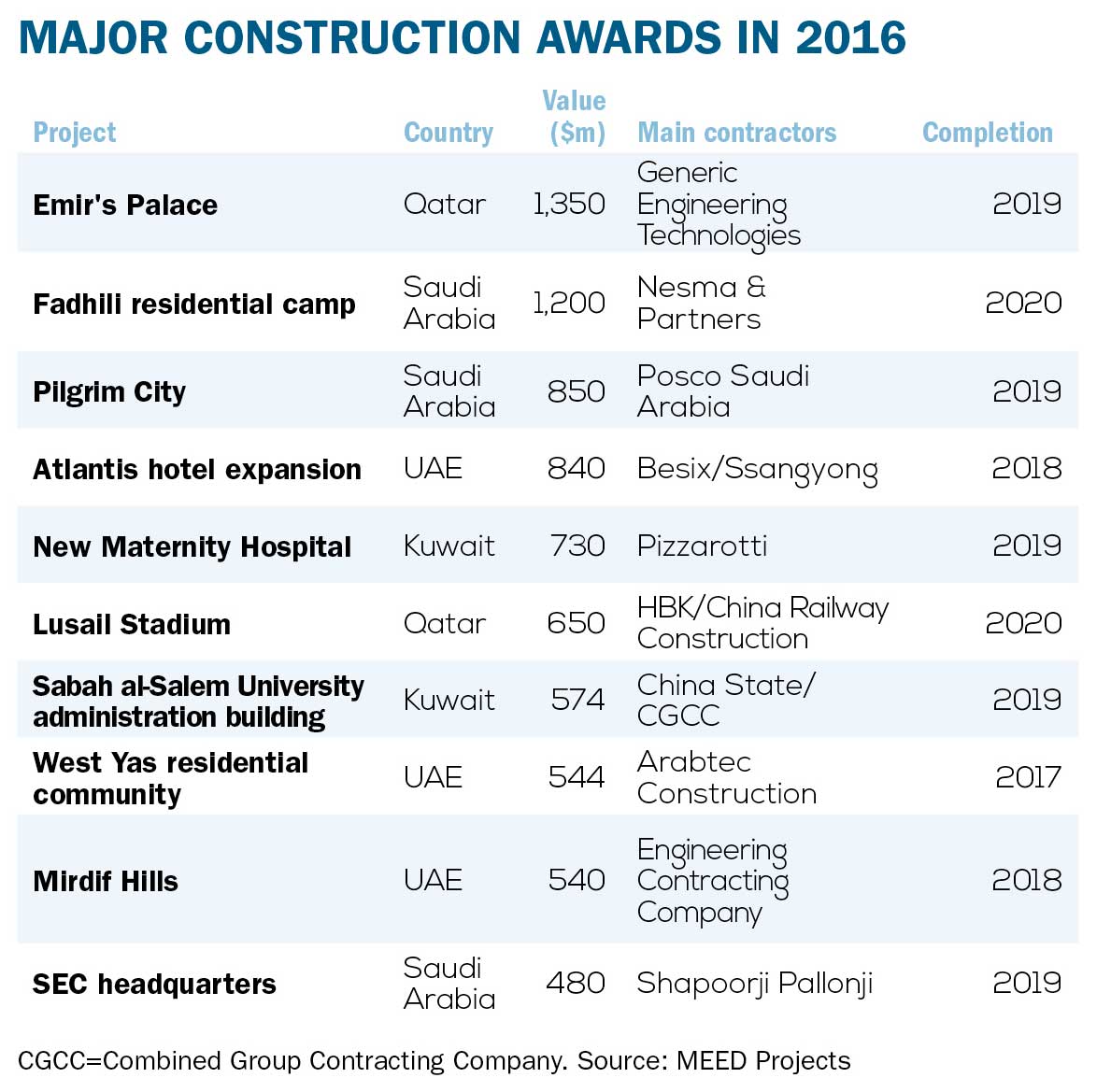

Construction companies in the GCC are still adjusting to lower levels of capital expenditure
In early 2015, construction firms began to digest the implications of the sharp fall in oil prices that started in mid-2014. With a sense of foreboding, company executives realised the market would have to find a new equilibrium as it adjusts to lower levels of project spending.
As project spending remains depressed, contractors have learnt in 2016 how painful that process can be.
During the first 10 months of 2016, there were $9.5bn of construction contracts awarded in Saudi Arabia, a 68 per cent drop on the $30bn signed during the same period a year earlier.
The biggest firms have been hurt the most, forced to shed thousands of jobs as they cut costs and pare resources to match the small amount of work the region has to offer.
Job cuts
In the regions largest market, Saudi Arabia, the two biggest construction companies, Saudi Binladin Group (SBG) and Saudi Oger, have been the hardest hit.
SBG has traditionally relied on government contracts for the bulk of its turnover and as spending has been curtailed, there have been fewer opportunities for new work. To make matters worse, following a crane collapse that killed more than 100 people in September 2015, the contractor was barred from winning new business in the kingdom. To cut costs, it had to lay off close to 70,000 of its workforce. The ban was lifted in May this year, but a cash squeeze has left SBG struggling under debt owed to local and international lenders.
Saudi Oger has also been struggling financially. It has reportedly asked Saudi banks to freeze repayments on about

Major construction awards in 2016
Major construction awards in 2016
SR13bn ($3.5bn) of debt. The move comes as the firm has been unable to pay billions in salaries and loan repayments to banks after delays in receiving payment from the government for work completed.
With contractors in desperate need of some respite, the Saudi authorities say they intend to clear payment arrears to contractors by the end of the financial year in December, which should allow construction companies to collect more funds and meet their debt obligations.
The amount SBG owes to the banks is SR25bn, according to bankers estimates, while lenders have a combined estimated exposure to Saudi Oger of about SR13bn.
UAE firms
The challenges facing the regions largest contractors are not limited to Saudi Arabia. In the GCCs other major construction market, the UAE, heavyweight firms are also feeling the strain.
Dubai-listed Arabtec Holding continued to operate in the red in 2016. It reported AED225.5m ($61.4m) in losses for the third quarter, down from an AED944.8m loss in the same period last year.
The main benefit UAE construction firms have is the opportunity to win new work
Abu Dhabis Al-Jaber Group is in the process of restructuring $1.6bn of debt, and is considering selling its Dubai-based construction company Alec in a deal that could raise about AED2bn.
There has also been a change in shareholding at Dubai-based Habtoor Leighton Group (HLG). Australias Cimic, formerly known as Leighton, has entered into an agreement with the business two other shareholders allowing Al-Habtoor Holdings to exit the business.
The main benefit that UAE construction companies have is the opportunity to win new work. Arabtec, Al-Jaber and HLG have all secured new orders in the country this year.
During the first 10 months of 2016, $22bn of deals were awarded in the UAE. This is 15 per cent down on the $26bn awarded during the same period in 2015, but still a considerably more robust performance than the sharp slowdown in Saudi Arabia. The bulk of the new project opportunities have been in Dubai, which has an ambitious set of projects that it plans to complete ahead of staging the Expo in 2020.
Increased spending
Between January and the end of October 2016, Dubai awarded $20bn of construction contracts, a one-third increase on the $15bn inked during the first 10 months of 2015. More awards are expected in 2017, with major building contracts due to be let at the Expo site, Dubai Creek Harbour, Deira Islands and Dubai South, which includes Al-Maktoum International airport.
These new awards, together with projects that are already being built, should drive up spending on construction in 2017. Regional projects tracker MEED Projects estimates that $21bn was spent on construction projects in Dubai in 2016. In 2017, that number is expected to rise to just under $27bn before peaking at more than $31bn in 2018 and levelling at $30bn in 2019. As the emirate then turns to hosting the Expo in 2020, spending is expected to drop sharply to about $15bn.

Major awards expected in 2017
Major awards expected in 2017
The hope is that Saudi Arabias projects market will begin to recover by the time the Dubai market starts to slow. While it is still too early to make that call definitively, steps are starting to be taken, which, if fully implemented, will lead to an increase in project spending in the kingdom towards the end of the decade.
The first step is the appointment of consultants to establish project management offices (PMOs) at ministries and their related entities. The overview document for Riyadhs Vision 2030, released in late April, emphasised the key role that PMOs will play in transforming the kingdoms economy, by managing large and complex schemes as a way of containing spending and increasing returns from infrastructure investments.
The first consultancy deal to be tendered is for the National Project Management Office (NPMO), which will oversee future capital expenditure projects in Saudi Arabia. Once a consultant is appointed for the NPMO, appointments can be made for the other PMOs.
2018 recovery
If these new levels of oversight can be put in place during 2017, then the first wave of projects planned and procured using this delivery mechanism should start to come to the market in 2018 and 2019. For contractors in Saudi Arabia that are desperate for new work, that date cannot come soon enough.
The regions third-largest market has also declined this year. Construction contract awards in Qatar during the first 10 months fell to $8.6bn, down from $19bn during the first 10 months of 2015.
The market is showing signs of improvement, however. In August and September, deals were awarded for two major road construction projects, and in November a joint venture of the local HBK Contracting and China Railway Construction Corporation was awarded the contract to build the Lusail stadium.
More awards are expected. In October bids were submitted for the deal to build the Fifth Precinct stadium project, and firms were also preparing to submit proposals to build another stadium development known as the Fourth Precinct.
The total value of construction awards in Oman and Kuwait also fell this year. In Kuwait, there were $6.6bn of awards during the first 10 months of this year, down from $11bn during the same period last year. In Oman, the value fell from $5bn in the first 10 months of 2015 to about $2bn in the first 10 months of 2016.
Bahrain, the regions smallest projects market, has been the only one to register growth in 2016, awarding $2.8bn of contracts during the first 10 months of the year, up from $1.9bn during the same period of 2015.
You might also like...

Saudi Arabia extends Jubail substation bid deadline
03 March 2026

Daewoo pulls out of Libya upstream tender
03 March 2026
A MEED Subscription...
Subscribe or upgrade your current MEED.com package to support your strategic planning with the MENA region’s best source of business information. Proceed to our online shop below to find out more about the features in each package.
Take advantage of our introductory offers below for new subscribers and purchase your access today! If you are an existing client, please reach out to your account manager.












